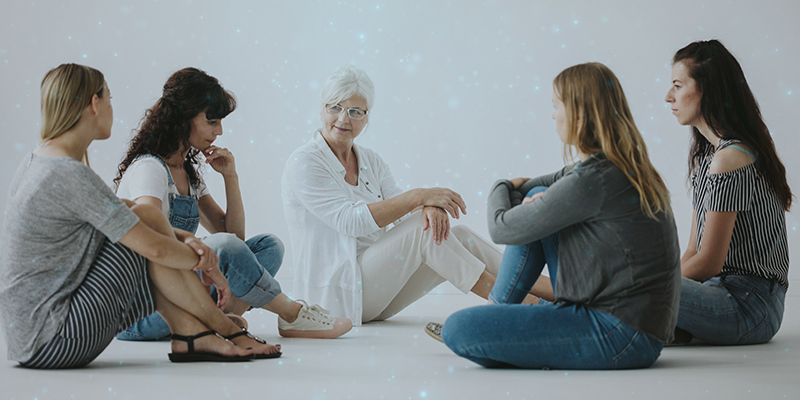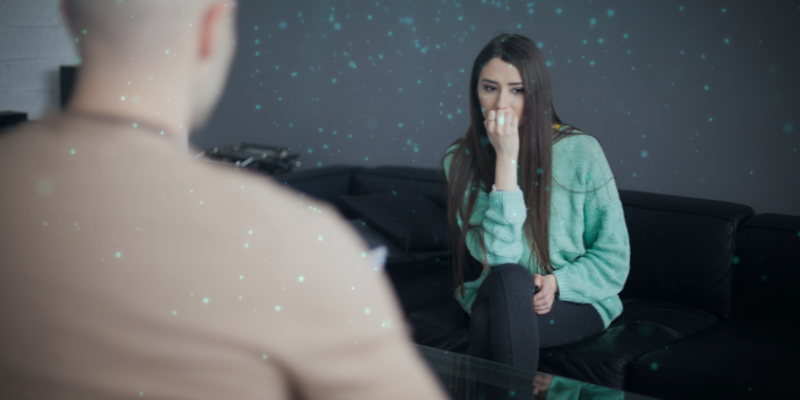
If you or someone you love suffers from anxiety—as more than 40 million U.S. adults do—it’s important to know the signs and triggers of an anxiety attack. An anxiety attack is usually the result of an increasing number of stressors that lead to an overwhelming experience of anxiety.
Because anxiety attack symptoms are similar to those of a panic attack, they are often thought to be the same thing. But they are, in fact, different. Adding to the confusion, in some cases, an anxiety attack can arise without any knowable trigger at all.
Here’s what you need to know about anxiety attacks, how they differ from panic attacks, and what to do if you have one.
Anxiety attacks result from a perfect storm of life stressors, psychological factors, and physical triggers, and sometimes can occur with no triggers at all. Click To TweetWHAT IS AN ANXIETY ATTACK?
We all experience anxiety from time to time. However, for many people, the anxiety “idle” is set too high. They worry and are nervous about everyday life responsibilities and events. They may experience excessive amounts of anxious and nervous feelings that are disproportionate to circumstances—even ones that pose no threat.
This excessive anxiety —also called an anxiety disorder—is the most common mental health concern among U.S. adults today. More than one-third of Americans will experience an anxiety disorder at some point in their lives, the National Institute of Mental Health reports.
For anxious people who have an added life stressor such as a new job or activity, a work deadline, or a big life event, anxious feelings, stress, and tension can begin to mount. This stress typically builds up slowly. Eventually, it reaches an overwhelming level of all-encompassing fear, stress, and anxiety that can last for hours, days, or even longer. This experience is called an anxiety attack.
Symptoms of anxiety attack may include any of the following:
- Increased heart rate and muscle tension
- Hypervigilance, such as being easily startled or feeling jumpy
- Restlessness and problems sleeping
- Fatigue and/or dizziness
- Difficulty concentrating
- Irritability
If an individual has no strategies for calming these worries and fears, an anxiety attack can interfere with normal and healthy daily functioning. Anxiety attacks can be mild or moderate, as well as severe.
ANXIETY ATTACK VS. PANIC ATTACK
Whereas anxiety attack symptoms gradually build up, panic attacks are less predictable, often come on suddenly, and are generally more intense. They may seemingly come out of the blue (called unexpected panic attacks) or in response to a known trigger (expected panic attacks).
Common triggers may be:
- Having a phobia, like a fear of heights and looking down from a tall building
- Fear of flying and getting on an airplane
- Fear of spiders and spotting one in your room
Whether they are expected or not, the symptoms can come on very quickly and are highly disruptive.
The symptoms of a panic attack include:
- Chest pain/pounding or racing heart (can feel like one is having a heart attack)
- Hyperventilation/shortness of breath (may lead to feeling lightheaded and dizzy
- Shaking, sweating, hot flashes, or chills
- Stomach pain or nausea
- A feeling of being choked/smothered
- A feeling of being “detached” from one’s body or surroundings
A panic attack can last anywhere from 5-20 minutes with an average of 10 minutes. The symptoms come on strong and may make an individual feel like they are losing control, going crazy, or may be dying. Although it can feel life-threatening, a panic attack poses no serious harm.
Here’s a quick recap of the differences between a panic attack and an anxiety attack:
Panic Attack vs. Anxiety Attack
| Usually occurs with
trigger, but not always. |
Usually occurs in response to a perceived stressor(s) or threat(s), except in rare cases. |
| Symptoms often appear suddenly. | Anxious feelings build gradually over time. |
| Highly disruptive symptoms. | Symptoms vary from mild to severe. |
| Lasts a short duration (average 10 minutes). | Lasts for hours, days, or longer. |
ANXIETY TRIGGERS
Anxiety attacks result from a perfect storm of life stressors, psychological factors, and physical triggers, and sometimes can occur with no triggers at all.
Any of the following life stressors could trigger or contribute to an anxiety attack:
- Financial stress
- Job loss or work-related stress
- Stress about world events
- An upsetting health diagnosis
- Marriage, divorce, breakup, or having a child (life transitions)
- Caregiving duties
- Grief or loss of a loved one
- Performances or presentations
- Exams
- Driving in heavy traffic
- Global pandemic
- Parties or social events
- Perceived threats
There are physical triggers too:
- Research shows that caffeine consumption can increase anxiety.
- Studies indicate lack of sleep can take anxiety levels up.
- Medications such as birth control pills, over-the-counter cough and congestion medicines, and weight-loss pills can affect how you feel and trigger anxiety.
- Skipping meals can cause your blood sugar to drop and trigger anxiety.
Additionally, there are mental health issues that may factor into an anxiety attack. Chronic negative thinking—including “all or nothing” thinking and negative self-talk—can make anxiety worse.
Other mental health conditions—such as post-traumatic stress disorder (PTSD), depression, social anxiety disorder, and substance abuse disorder—can play a role in anxiety attacks too. This is especially true when these issues go untreated.
REASONS FOR ANXIETY ATTACKS WITHOUT TRIGGERS
There are instances when an individual may experience an anxiety attack for no apparent reason. This generally happens when there’s an underlying cause beyond an individual’s awareness.
- Genetics: For example, anxiety runs in families. There may be a genetic component fueling a person’s anxiety attack.
- Brain physiology: People who experience “free-floating” anxiety have been shown to have denser neurons in some regions of their mind while having fewer in other areas, according to one brain-imaging study.
- Being female: Experts also report that women are more prone to anxiety attacks.
- Being shy: Having a shy or tentative personality increases the risk of this form of anxiety.
- Health conditions: Having a thyroid imbalance or heart health issue can contribute to an anxiety attack.
HOW TO CALM AN ANXIETY ATTACK
If you believe you’re having an anxiety attack, the following actions may help to bring calm. Of course, if it is a severe attack, reach out to a mental health professional or go to your nearest emergency room for care.
1. Practice deep breathing.
Shallow or erratic breathing is a common symptom of anxiety attacks. Less oxygen to the brain only increases anxiety. If you can take slow, deep breaths you’ll boost oxygen to your brain and gain better control of how you feel.
Try this:
- Lie on your back and place a small book on your stomach.
- While you slowly inhale through your nose, make the book go up. Hold your breath at the top of your inhalation for a few seconds.
- As you exhale, make the book go down. Then hold your breath for a few seconds before inhaling again.
- Repeat this 10 times and notice how relaxed you feel.
2. Be with the feeling.
Unless the situation is life-threatening, stay present. Anxiety will not go away until you face the fear or concern.
If your anxiety is triggered by past trauma, eye movement desensitization and reprocessing (EMDR) is an effective treatment. It helps to remove the emotional charges of traumatic memories. Additionally, exposure therapy may be helpful as it safely exposes you to anxiety-provoking stimuli and provides techniques for handling it.
3. Write it down.
Write down your thoughts. Pay attention to the automatic negative thoughts (ANTs) in your mind and jot them down to see if they are accurate. If they are distorted, challenge them by writing down a more realistic version of the same thought. Cognitive behavioral therapy can be helpful in correcting negative thinking. Research has shown CBT to be effective in helping to reduce anxiety.
Of course, general good self-care will go a long way to keeping anxiety in check. Be sure you regularly get plenty of restful sleep, exercise, and good nutrition. In addition, engage in restorative practices, such as meditation, hobbies, yoga, and relaxation.
Anxiety attacks, panic attacks, and other mental health issues can’t wait. At Amen Clinics, we’re here for you. We offer in-clinic brain scanning and appointments, as well as mental telehealth, clinical evaluations, and therapy for adults, teens, children, and couples. Find out more by speaking to a specialist today at 888-288-9834 or visit our contact page here.





Excellent excellent article. Thank you very much
Comment by Peggy Lee — October 6, 2023 @ 3:29 AM
Dr. Amen,
Do you have any tips for those with panic from phobias – such as flying?
Comment by Carol — October 6, 2023 @ 3:55 AM
Glad to see a better description of panic attacks. I usually read and am told just about the heart racing and hyperventilating, but it's so much more than that. I feel like I'm dying everytime. Surprised about the time length though. My panic attacks will last hours sometimes, so I unfortunately end up going to the ER. I don't think mine have only ever been 10 minutes long, but really depends on if I can get myself to calm down before the physical systems become too much.
Comment by Kaylin — October 6, 2023 @ 4:27 AM
I am badly in need of a brain scan (just the scan and an interpretation of the results) but I am 81, retired/on a fixed income, and do not have the $5000+ price tag. I have a Care Credit account that could cover some of it. I have Medicare and an HMO but don't believe they will cover any of this cost. Can you suggest any options? THANK YOU
Comment by Anthony Horn — October 6, 2023 @ 5:29 AM
What about magnesium? I had these symptoms and after taking magnesium I felt better. Would love to see your insight on that. Thanks!
Comment by Dede — October 6, 2023 @ 6:05 AM
Excellent article and reminder of what to do to keep anxiety in check. Thank you!
Comment by Paola DiNatale — October 6, 2023 @ 6:52 AM
another selfcare, is Emotional Freedom Technique, to release the body sensations, negative thoughts, and feeling of panic, as well as root causes. Easy to learn. Many youtubes, books, and also search out trained EFT practioners in your area. I have used this on myself for phobias, panic attacks, and depression. Very helpful. Thank you.
Comment by geraldine vaurigaud — October 6, 2023 @ 9:54 AM
Interesting to read about the various reasons or triggers for anxiety. I find that I can become very anxious in the mornings, especially when I have something scheduled, and it usually occurs while I’m putting together my breakfast. It doesn’t make sense to me generally, as I no longer work and do not have ‘urgent’ meetings or commitments looming. I am under a lot of stress otherwise, financially in particular, and I am 84 years old, but do find it odd that the anxiety often comes upon me in the morning , in the kitchen, particularly when I have something on my agenda (and I fear not being prepared in some way, or late) and it concerns me. Hard to explain.
Comment by Sheila — October 6, 2023 @ 1:41 PM
How to overcome severe claustrophobia. Even being in a small room with door closed brings on a panic attack
Comment by Nancy — October 6, 2023 @ 6:47 PM
I precisely wished to thank you so much again. I do not know what I might have taken care of without the actual basics revealed by you over this field. It was actually a real frightful condition for me, but being able to view the expert way you processed it made me to leap for fulfillment. I will be grateful for your advice and in addition sincerely hope you really know what an amazing job that you're putting in teaching some other people by way of your websites. More than likely you have never encountered any of us.
Comment by gralion torile — November 25, 2023 @ 12:33 PM
you have a great blog here! would you like to make some invite posts on my blog?
Comment by gralion torile — November 26, 2023 @ 8:53 AM